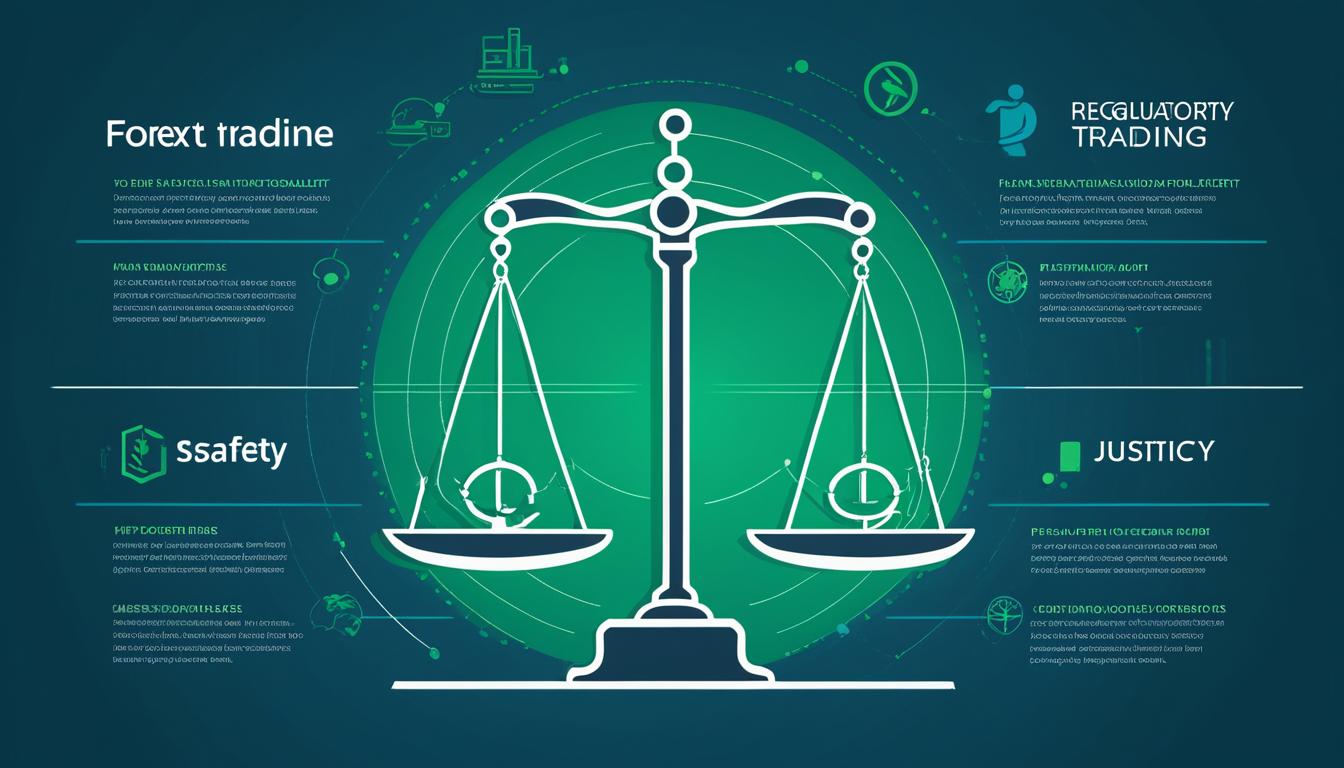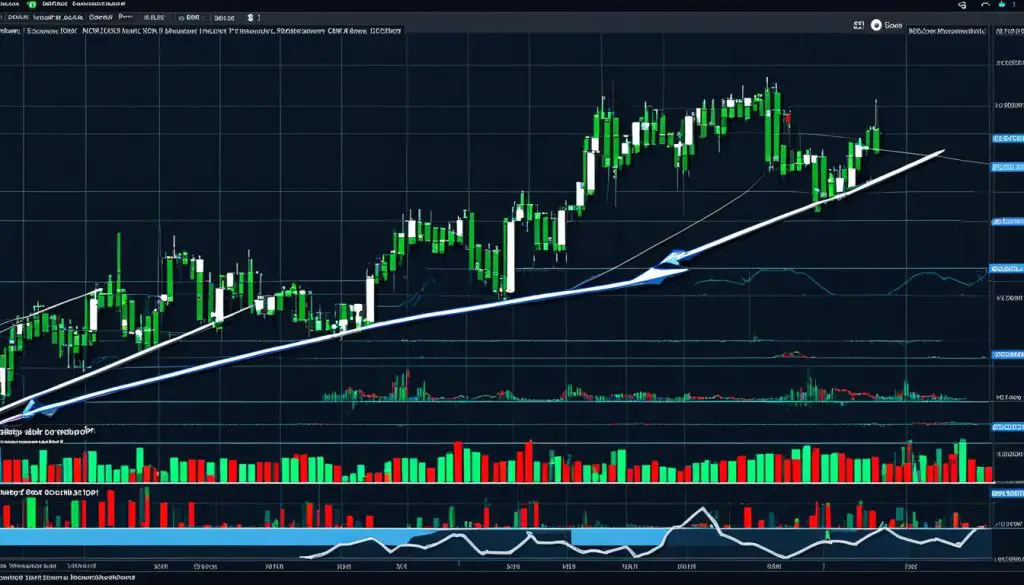When it comes to the dynamic realm of currency exchange, the question of is forex trading legal is paramount for anyone considering dipping into the vast ocean of the forex market. The legality of forex trading is largely influenced by a patchwork of forex regulations designed to protect market participants. In the United States, the regulatory landscape is rigorously shaped by the Commodity Futures Trading Commission (CFTC) and the National Futures Association (NFA), institutions that enforce stringent standards for market dealers and safeguard traders’ interests.
Despite the robust framework, the lure of the market’s potential riches has given rise to unscrupulous offshore entities. These unauthorized dealers exploit the absence of a centralized exchange and can engage in deceptive practices, including manipulation through proprietary trading platforms and concealed charges. For the uninitiated, the terrain of forex trading legality can be fraught with financial peril. But with knowledge and vigilance, navigating the forex maze becomes less daunting. This article endeavors to clear the haze surrounding the legal status of forex trading and will guide you through understanding the intricacies of forex regulations.
Understanding Forex Trading and Regulatory Oversight
With the increasing popularity of online currency trading, understanding the landscape of forex legality has become of paramount importance. As a global decentralized market, forex trading involves significant regulatory considerations that affaire not only the stability of the financial market but also the security of individual investors. Ensuring that forex trading regulations are duly followed, and knowing is forex trading allowed in your jurisdiction, could make the difference between successful trading and encountering legal issues.
Why Registration with CFTC and NFA Is Important
Forex brokers operating in the United States are required to register with two major organizations: the Commodity Futures Trading Commission (CFTC) and the National Futures Association (NFA). Registration is not just a formality; it provides a layer of protection to traders by ensuring brokers adhere to stringent standards concerning operational integrity, fiscal responsibility, and customer protection. These agencies are tasked with the enforcement of forex trading regulations, making it imperative for traders to engage only with firms that are CFTC and NFA registered.
The Role of Financial Requirements and Regulatory Examinations
Financial requirements and regulatory examinations are integral components of the forex trading framework, ensuring that firms maintain adequate capital to protect customer positions. These requirements also facilitate the smooth operation of the market by preventing practices that could lead to financial disputes or insolvency. Regulatory examinations help in maintaining a clean and competent marketplace, closely monitoring the compliance of forex brokers with legal and financial norms.
How to Verify Dealer Authentication and Disciplinary History
Verification of a dealer’s authentication and examining any prior disciplinary history is crucial before committing to invest. There are resources provided by the CFTC and NFA that allow traders to confirm whether a forex dealer is registered and if there have been any regulatory issues or penalties in the past. This information arms traders with the knowledge necessary to make informed decisions and avoid potential investment scams that can result in significant forex customer losses.
| Resource | Function | Benefits |
|---|---|---|
| CFTC Reparations Program | Provides a forum for clients to file complaints against registered firms or individuals | Facilitates resolution of disputes and restoration of lost funds due to misconduct |
| NFA BACKGROUND AFFILIATION STATUS INFORMATION CENTER (BASIC) | Offers access to registration and disciplinary history of firms and individuals | Allows traders to make educated decisions by reviewing the credibility of market players |
| CFTC Registrations and Exemption Listings | Displays current registration status and exemptions of brokers and advisors | Enables verification of legitimacy and operational status within the industry |
In the pursuit of nurturing a secure forex ecosystem, the emphasis on forex trading regulations, forex legality, and whether is forex trading allowed under current laws cannot be overstressed. As the market continues to evolve, staying abreast of these regulatory requirements and due diligence processes is indispensable for the modern trader.
Legal Consequences of Forex Trading
The intricate web of forex trading laws and forex trading regulations can have significant ramifications for traders and brokers alike. Countries around the globe have adopted various legal frameworks that participants in the foreign exchange market must navigate carefully to avoid sanctions or more severe legal consequences.
In the United States, for instance, the Commodities and Futures Trading Commission (CFTC) dictates a series of measures like leverage caps, client fund segregation, and the prohibition of hedging strategies. Meanwhile, the European Union’s Markets in Financial Instruments Directive (MiFID) focuses on enhancing transparency and protecting investors against potential market abuses. Across Asia, there’s variation in approaches, from strict margin requirements in Japan to China’s rigorous capital control measures.
- U.S. Forex Regulations: Limitations on leverage, mandatory segregation of client funds, anti-hedging rules.
- EU Forex Directives: Transparency via MiFID law, investor protection measures.
- Asian Forex Legalities: Different standards include Japan’s strict margin rules, China’s capital controls, and Singapore’s regulated brokerage environment.
Ignorance of these forex regulations is not a valid defense and can lead to penalties, loss of operating licenses, and, for traders, the potential forfeiture of funds. Trading with a broker that fails to comply with local forex laws may result in traders facing financial loss without recourse to legal remedies, emphasizing the importance of understanding and adhering to these legal frameworks.
Brokers who operate without due authorization, or those conducting fraudulent activities, will not only face legal action but also risk irreparable damage to their reputation and the trust of the trading community. It is, therefore, imperative that both traders and brokers remain well-informed about the changing landscape of forex trading laws and stay in compliance to ensure the integrity and sustainability of their trading activities.
Is Forex Trading Legal? Breaking Down the Legality and Restrictions
The global landscape of forex trading legality is nuanced, with forex regulations varying significantly across different regions. Questions such as “is forex trading allowed?” are common among traders seeking to engage in currency exchange. Ensuring full compliance with local laws is paramount for the legitimacy of trading activities. Let’s delve into the intricacies of international forex laws and the necessity for adhering to regulated brokers.
International Forex Trading Law Variances
Understanding the legal terrain of forex trading transcends knowing the basics; it requires an in-depth appreciation of the international variances in regulations. Here’s a snapshot of how some regions approach forex trading legality:
- The European Union stays ahead of transparency and integrity through the Markets in Financial Instruments Directive (MiFID).
- In Asia, Japan has imposed strict margin requirements, while Singapore welcomes trading through internationally regulated brokers.
- ASEAN countries feature their distinct style of governance, reflective of their economic policies and market environments.
Legal Implications of Using Unregulated Brokers
Working with unregulated brokers carries inherent risks, including lack of legal protection and the real threat of fraud. For traders who might consider this route, the consequences can range from being caught in a Ponzi scheme to struggling with interminable withdrawal issues. Here’s a list of potential risks:
- Fraud scenarios such as Ponzi schemes and signal seller scams.
- Difficulties in fund withdrawal, leading to financial losses.
- Unforeseen fees and software scams designed to mislead traders.
Key Regulatory Bodies That Govern Forex Trading Globally
In the realm of forex, certain regulatory bodies stand out for their commitment to safeguarding both market stability and the interests of individual investors. Below is a table showcasing some of these authorities and their jurisdictions:
| Regulatory Body | Region/Jurisdiction | Notable Regulations |
|---|---|---|
| National Futures Association (NFA) | United States | Background checks, financial compliance, market integrity. |
| Financial Conduct Authority (FCA) | United Kingdom | Consumer protection, anti-money laundering, market surveillance. |
| Australian Securities and Investments Commission (ASIC) | Australia | Investor compensation schemes, broker accountability. |
| Monetary Authority of Singapore (MAS) | Singapore | Rigorous licensing, enforcement of best practices. |
These regulatory bodies play a crucial role in defining what forex trading legality implies for both brokers and traders, setting a framework upon which global forex trade operates. By complying with these standards, traders can navigate the complex world of forex with greater reassurance and legal security.
Is Forex Trading Legal in Your Country?
The legal status of Forex trading varies significantly across different countries. In this section, we will explore the legality of Forex trading in various nations around the world, highlighting the diverse regulations and restrictions that exist.
- Cambodia: Legal status unclear, likely unregulated.
- Guyana: No specific regulations, trading occurs via international platforms.
- Iran: Heavily restricted due to international sanctions.
- Jamaica: Legal and regulated by the Bank of Jamaica and the Financial Services Commission.
- Lesotho: No specific Forex regulations; trading is not widespread.
- Netherlands: Legal and regulated by the Netherlands Authority for the Financial Markets (AFM).
- Trinidad and Tobago: Legal, regulated by the Trinidad and Tobago Securities and Exchange Commission.
- Malaysia: Legal but heavily regulated by the Securities Commission Malaysia and Central Bank of Malaysia.
- Ethiopia: Not explicitly regulated; Forex trading is not common.
- Philippines: Legal and regulated by the Securities and Exchange Commission (SEC).
- Nigeria: Legal with regulation by the Central Bank of Nigeria (CBN).
- South Africa: Legal and regulated by the Financial Sector Conduct Authority (FSCA).
- United States (America): Strictly regulated by the Commodity Futures Trading Commission (CFTC) and the National Futures Association (NFA).
- Israel: Legal and regulated by the Israel Securities Authority (ISA).
- Sweden: Legal and regulated by the Swedish Financial Supervisory Authority (Finansinspektionen).
- Switzerland: Legal and strictly regulated by the Swiss Financial Market Supervisory Authority (FINMA).
- Turkey: Legal, but recently subject to stricter regulations.
- Saudi Arabia: Legal and regulated by the Saudi Arabian Monetary Authority (SAMA).
- Bahrain: Legal and regulated by the Central Bank of Bahrain.
- Finland: Legal and regulated by the Finnish Financial Supervisory Authority (FIN-FSA).
- France: Legal and regulated by the Autorité des Marchés Financiers (AMF).
- Indonesia: Legal with regulations from the Bank of Indonesia and Commodity Futures Trading Regulatory Agency (BAPPEBTI).
- Italy: Legal and regulated by the Commissione Nazionale per le Società e la Borsa (CONSOB).
- Russia: Legal, but facing increasing regulation and oversight.
- Tanzania: Legal but not well-regulated.
- Uganda: Legal, regulated by the Bank of Uganda.
- Vietnam: Restricted, with stringent foreign exchange controls.
- Bangladesh: Technically legal but heavily regulated and not encouraged.
- Canada: Legal, each province has its own regulations.
- China: Heavily restricted by the government, with trading mainly through regulated institutions.
- Ghana: Legal, with regulation by the Securities and Exchange Commission of Ghana.
- Mauritius: Legal and regulated by the Financial Services Commission (FSC) of Mauritius.
- Rwanda: Legal, but not explicitly regulated.
- South Korea: Legal and regulated by the Financial Supervisory Service.
- Zambia: Legal, but the market is not well developed.
- Nepal: Not explicitly legal or regulated.
- Pakistan: Legal, regulated by the Securities and Exchange Commission of Pakistan.
- Botswana: Legal, but the market is not well developed.
- Egypt: Legal and regulated by the Egyptian Financial Supervisory Authority.
- Ireland: Legal and regulated by the Central Bank of Ireland.
- Kuwait: Legal, regulated by the Central Bank of Kuwait.
- Namibia: Legal, but with stringent foreign exchange controls.
- Oman: Legal, regulated by the Central Bank of Oman.
- India: Restricted to currency pairs involving the Indian Rupee, regulated by the Securities and Exchange Board of India (SEBI).
- Japan: Legal, with strict regulations enforced by the Financial Services Agency (FSA).
- Qatar: Legal and regulated by the Qatar Financial Centre Regulatory Authority and Qatar Central Bank.
- Thailand: Legal, under regulation by the Securities and Exchange Commission of Thailand.
- Zimbabwe: Legal, but the market is not well developed and faces foreign exchange shortages.
- Germany: Legal and regulated by the Federal Financial Supervisory Authority (BaFin).
- Kenya: Legal and regulated by the Capital Markets Authority (CMA).
- Singapore: Legal and regulated by the Monetary Authority of Singapore (MAS).
- Sri Lanka: Legal, but heavily regulated by the Central Bank of Sri Lanka.
Conclusion
As we delve into the intricacies of the foreign exchange market, a thorough understanding of forex trading laws and regulations becomes indispensable. The landscape of forex legality is as diverse as the global markets themselves, and only through diligent research and an adherence to the rules can investors navigate this space safely. Initiating trades with a broker is not merely about looking at potential profits; it is equally about ensuring that you are operating within the legal confines of the industry and safeguarding your investments from dubious practices.
Staying Informed to Ensure Safe and Legal Forex Trading
For those looking to engage in forex trading, the emphasis must be on education and verification. Forex legality is not simply a slogan but a framework within which successful and secure trading can occur. By prioritizing partnerships with regulated brokers who comply with stringent requirements and offer transparent operations, traders mitigate the risks associated with fraudulent players in the market. Due diligence extends beyond account setup; it involves continuous monitoring and staying abreast of legal revisions that can impact trading tactics.
Navigating the Forex Market with Regulatory Wisdom
Recognizing the complexities of forex trading regulations equips market participants with a kind of ‘regulatory wisdom’—a keen sense for the ebb and flow of compliance measures and legal mandates that shape forex dealings. In a market underscored by volatility, knowledge is the currency of choice, securing not just financial returns but also legal protection. In conclusion, an informed trader is a protected trader. By integrating regulatory know-how into your trading strategy, you operate on a platform of legitimacy, ensuring that each transaction is as lawful as it is potentially lucrative.
Disclaimer
This article is for informational purposes only and does not constitute legal, financial, or professional advice. The legality of Forex trading can be subject to complex laws that may change over time and may require interpretation by a licensed professional. The information presented is based on data available at the time of writing and may not reflect the most current legal developments. Readers are responsible for conducting their own due diligence and consulting with professional advisors for advice on their specific circumstances. The author and publisher of this article disclaim any liability for any direct or consequential loss arising from the use of the information provided herein.
FAQ
Is forex trading legal?
Yes, forex trading is legal in many countries around the world, including the United States. However, each country has its own regulatory framework and legal guidelines which must be followed. Investors are advised to work with brokers that are registered and comply with the regulations of their jurisdiction.
What are the legal consequences of forex trading?
The legal consequences of forex trading can range from civil penalties and fines for noncompliance with regulations to criminal charges in cases of fraud. Additionally, traders may risk losing their funds if engaged with unauthorized or fraudulent brokers. Compliance with forex trading laws and regulations is essential to avoid legal repercussions and protect one’s investments.
How do international forex trading law variances affect traders?
International forex trading law variances affect traders by imposing different rules and guidelines depending on the country. For example, leverage limits, capital requirements, and broker obligations can vastly differ, impacting how traders engage with the forex market. Traders must understand and adhere to the legal framework of their jurisdiction to trade legally and effectively.
What are the legal implications of using unregulated brokers?
Using unregulated brokers can have serious legal implications for traders. Traders may not be protected by law and could fall victim to fraud, face problems withdrawing funds, or encounter various scams. Trading with unregulated brokers is risky and can result in financial loss, legal issues, and potentially violation of local laws.
Which key regulatory bodies govern forex trading globally?
Key regulatory bodies that govern forex trading globally include the National Futures Association (NFA) and Commodity Futures Trading Commission (CFTC) in the United States, the Financial Conduct Authority (FCA) in the United Kingdom, the Australian Securities and Investments Commission (ASIC), and the Monetary Authority of Singapore (MAS), among others. These organizations enforce rules to promote fair and transparent trading, protect against fraudulent practices, and maintain market integrity.






